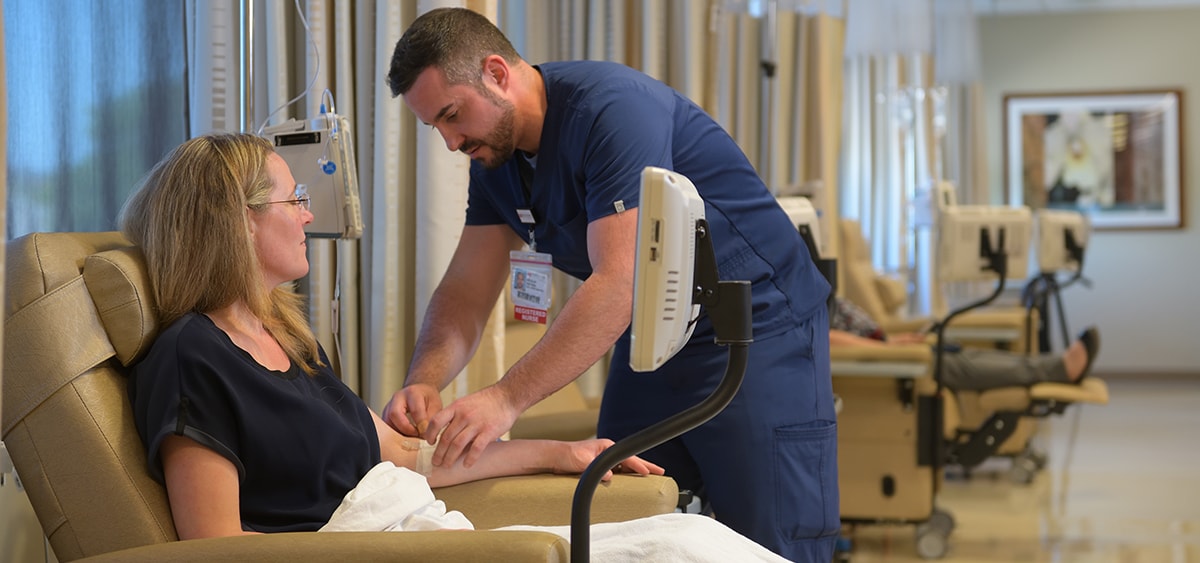
Coping with Chemotherapy Side Effects
-
Updated: February 18, 2020
Maybe you know someone who had a bad experience with chemotherapy, or maybe you’ve seen it depicted in a negative way in a movie or on TV. Regardless of where you’ve crossed paths with this treatment in the past, you’ve probably heard about its unpleasant side effects.
But the downsides of chemo are often more manageable than you might think.
“Chemo is very different today,” said Kathleen Smith, MSN, CRNP, ANP-BC, ONC, a nurse practitioner at Fox Chase Cancer Center. “We have a good handle on how to manage common side effects, and we try to prevent them.”
Common side effects of chemotherapy
Chemotherapy can cause a wide range of side effects, and everyone reacts to treatment differently. Still, some side effects tend to be particularly common, Smith said. These can include:
- Nausea and vomiting
- Fatigue
- Hair loss
- Skin changes, such as dryness
- Loss of appetite and changes in taste, including a metallic taste in your mouth
- Weakened immune system, which increases the risk for infections
If you start to experience these or other problems, let your cancer care team know.
“Some patients are reluctant to report side effects, maybe for fear that the drug will be stopped, and this is their lifeline,” Smith said. “But it’s important to report side effects. If we know about them, we can find ways to help.”
For instance, medications can do a good job of controlling nausea and vomiting.
“Some of the anti-nausea medications work very quickly for nausea that can happen immediately after chemo and longer-acting meds can control nausea when a patient is at home,” Smith explained. “We’ll often give a combo of anti-nausea meds. Sometimes if one doesn’t work, you can try a different one that might be more effective.”
How you can help manage your side effects
Simple lifestyle changes can also make a difference. A few that Smith often recommends:
- Gentle exercise can fight fatigue and boost your energy. Even 15 minutes of walking or yoga a few times a week can make a difference, she said.
- Sun protection can minimize skin problems. “You’re more sensitive to the sun on chemo,” Smith said. Use sunscreen daily, and stay in the shade as much as possible. Use a moisturizer if your skin seems drier during chemo.
- Ginger or cinnamon gum or candy can help get rid of a metallic taste in the mouth and make eating a little more enjoyable. Smith recommends having a piece of candy or gum right before a meal.
- Frequent handwashing and avoiding large crowds can reduce your risk of infections.
Serious side effects of chemotherapy
Undergoing chemo affects your blood cell and platelet counts, which can make you more susceptible to dangerous and even life-threatening infections. Signs of a possible infection include:
- Fever of 100.5°F or higher
- Bleeding or unexplained bruising
- Rash or allergic reaction
- Intense chills
- Pain or soreness where your chemo or catheter was placed
- Unusual pain or intense headaches
- Shortness of breath or trouble breathing
- Long-lasting diarrhea or vomiting
- Bloody stool, blood in your urine, or burning while urinating
Contact your care team immediately if you notice any of these issues.
“It doesn’t matter if it’s a Saturday night at 2 a.m.,” Smith said. “In a short time you can get very ill, so don’t wait to call.”
Getting support during your treatment
Finally, another—and equally important—tip for coping with chemo’s side effects is to surround yourself with a good support team, including a provider you trust and who has your best interests in mind, Smith said.
“It’s hard to feel sick or not like yourself, and you want to rely on people who care about you and are going to help you,” she said. “Having a positive attitude can really help too. Research shows that a positive attitude can improve outcomes. Many cancers today that are treatable or curable weren’t in the past, and having a positive attitude and relying on your support team can help you get you through your treatments.”
Learn more about preparing for and coping with chemotherapy.
